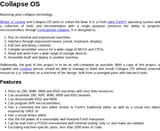Anonymous
7/25/2025, 5:51:57 AM No.106016441
Theorycrafting a way of life in a post-privacy world.
If we accept the logical extension of this (and other digital ID stuff all arriving at once):
>>106014995
the conclusion is that in something like 5 years, the internet and computing as we've known it is 100% over. The only computing devices you will have access to are 100% corporate controlled: phones or cloud-only operating systems. 100% tracking of everything you do and see, up to and including continuous screenshots. Any and all edge cases will be gimped by inescapable digital ID based tracking. People holding out with old hardware may last another 5 years beyond that, but they may also just get hard banned at the ISP level anyway.
So. How do we proceed here? First question is: what's the minimal amount of devices you can get away with to do the absolute bare minimum of computing work (paying bills, etc)? Second question: How do we arrange our lives and living spaces to avoid at-home tracking (wi-fi sensing, TV cameras, etc). Exactly how far can we go and still live a somewhat normal (but reduced) modern life if we refuse to surrender?
I feel like rededicating myself to reading is a big thing. Even if they push through physical-book resale restrictions (literally being proposed) there's too many pre-existing books to ever lose access.
A single phone seems like the best option. It'll cover the normies needs, so it'll cover yours. Banking, payments, etc. You can keep it in a separate room so it's not listening to you all the time, and you don't have to carry it with you for the most part when you leave the house.
What other strategies do we have here?
If we accept the logical extension of this (and other digital ID stuff all arriving at once):
>>106014995
the conclusion is that in something like 5 years, the internet and computing as we've known it is 100% over. The only computing devices you will have access to are 100% corporate controlled: phones or cloud-only operating systems. 100% tracking of everything you do and see, up to and including continuous screenshots. Any and all edge cases will be gimped by inescapable digital ID based tracking. People holding out with old hardware may last another 5 years beyond that, but they may also just get hard banned at the ISP level anyway.
So. How do we proceed here? First question is: what's the minimal amount of devices you can get away with to do the absolute bare minimum of computing work (paying bills, etc)? Second question: How do we arrange our lives and living spaces to avoid at-home tracking (wi-fi sensing, TV cameras, etc). Exactly how far can we go and still live a somewhat normal (but reduced) modern life if we refuse to surrender?
I feel like rededicating myself to reading is a big thing. Even if they push through physical-book resale restrictions (literally being proposed) there's too many pre-existing books to ever lose access.
A single phone seems like the best option. It'll cover the normies needs, so it'll cover yours. Banking, payments, etc. You can keep it in a separate room so it's not listening to you all the time, and you don't have to carry it with you for the most part when you leave the house.
What other strategies do we have here?
Replies:







